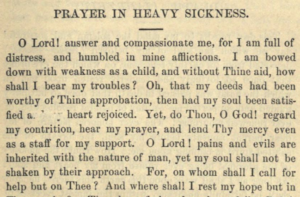Contributor(s): Shared on: 22 June 2020 under the Creative Commons Zero (CC 0) Universal license a Public Domain dedication Categories: Tags: | Contribute a translation | Source (English) |
|---|
|
Lord! answer and compassionate me, for I am full of distress, and humbled in mine afflictions. I am bowed down with weakness as a child, and without Thine aid, how shall I bear my troubles? Oh, that my deeds had been worthy of Thine approbation, then had my soul been satisfied and my heart rejoiced. Yet, do Thou, God! regard my contrition, hear my prayer, and lend Thy mercy even as a staff for my support. O Lord! pains and evils are inherited with the nature of man, yet my soul shall not be shaken by their approach. For, on whom shall I call for help but on Thee? And where shall I rest my hope but in Thy mercies? “Though my flesh and my heart fail; God is my consolation, my portion for ever; for, lo, they that are far from Thee shall perish, they that go after the favor of others shall be destroyed.” Ah! were my days of sorrow lengthened to the number of mine offences, yet, O Lord! I would still bless Thy name, and Thy dispensations, for Thou art my consolation, the resting place of my soul. Then, wherefore should I complain? I will resign myself to Thy will, for Thou, Lord! art the Author of my being, and wilt not destroy the work which Thou hast made. Then shall I profit from my woes, and all times rest in Thy hands; for Thou, my God! art my Savior and my Living Redeemer. Amen. |
“Prayer in Heavy Sickness” is one of thirty prayers appearing in Rabbi Moritz Mayer’s collection of tehinot, Hours of Devotion (1866), of uncertain provenance and which he may have written. –Aharon Varady Source(s)
 Rabbi Moritz Mayer (originally Moses Maier, later Maurice Mayer; 1821-1867) born in Dürckheim-on-the-Haardt, Germany, fled to the United States and to New York as a political refugee of the 1848 revolution. In 1859, after seven years as the rabbi of Ḳ.Ḳ. Beth Elohim in Charleston, South Carolina, he returned in poor health to New York where he contributed frequently to the Jewish press, and translated various German works into English: Rabbi Samuel Adler's catechism, Abraham Geiger's lectures on Jewish history, and Ludwig Philipson's pamphlet, Haben die Juden Jesum Gekreuzigt? (the Crucifixion from the Jewish Point of View), et al. In 1866, a number of his English translations of Fanny Neuda's teḥinot in German (from her Stunden Der Andacht, 1855/1858) were published in a volume he titled Hours of Devotion. The work also included a number of his own prayers as well as those of Marcus Heinrich Bresslau. The following year, Moritz Mayer passed away. He was 45 years old.(We are indebted to Anton Hieke for his research on Mayer, " Rabbi Maurice Mayer: German Revolutionary, Charleston Reformer, and Anti-Abolitionist" published in Southern Jewish Life, 17 (2014), pp. 45-89.)For Mayer's translations of prayers by other authors, please visit here. Aharon Varady (M.A.J.Ed./JTSA Davidson) is a volunteer transcriber for the Open Siddur Project. If you find any mistakes in his transcriptions, please let him know. Shgiyot mi yavin; Ministarot naqeni שְׁגִיאוֹת מִי־יָבִין; מִנִּסְתָּרוֹת נַקֵּנִי "Who can know all one's flaws? From hidden errors, correct me" (Psalms 19:13). If you'd like to directly support his work, please consider donating via his Patreon account. (Varady also translates prayers and contributes his own original work besides serving as the primary shammes of the Open Siddur Project and its website, opensiddur.org.) Read a comment / Leave a comment (moderated) Works of related interest: |








![[Prayer] in Sickness, by Lilian Helen Montagu (1895)](https://opensiddur.org/wp-content/uploads/2023/05/in-sickness-Lilian-H.-Montagu-1895-cropped-250x250.png)



Leave a Reply